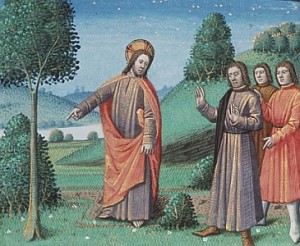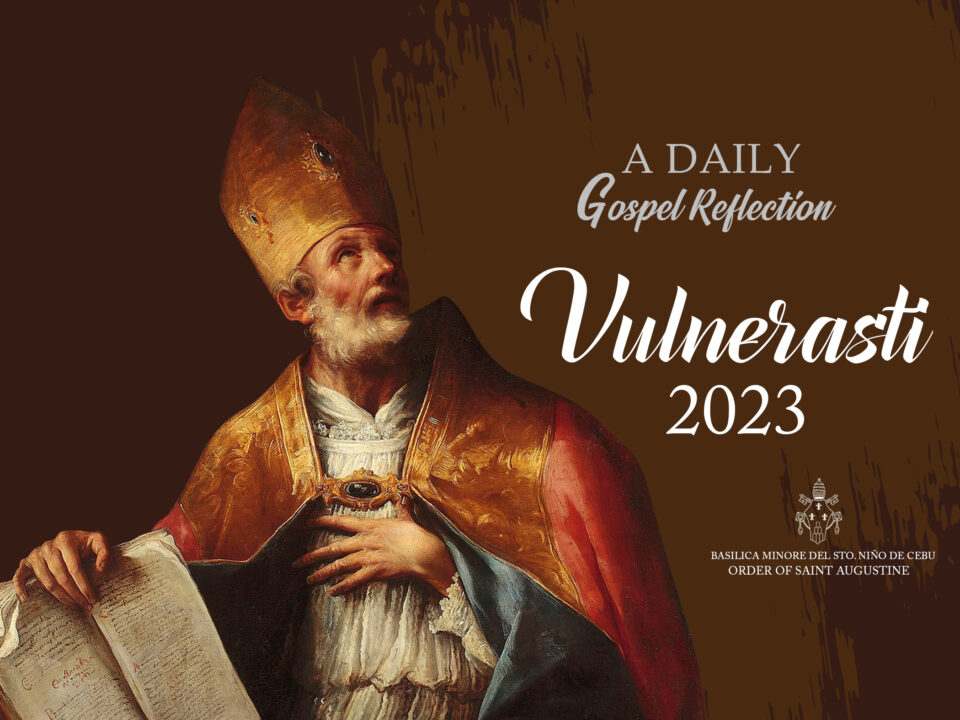Sunday | Third Sunday of Lent

https://www.catholicsteward.com/2013/02/20/stewardship-reflection-on-lectionary-readings-march-3-2013/
Today’s Reflection
Gospel: Lk 13:1-9
March 20, 2022 | Sunday
One day, some people told Jesus what had occurred in the temple: Pilate had had Galileans killed, and their blood mingled with the blood of their sacrifices. Jesus asked them, “Do you think that these Galileans were worse sinners than all other Galileans, because they suffered this? No, I tell you. But unless you change your ways, you will all perish, as they did.
And those eighteen persons in Siloah, who were crushed when the tower fell, do you think they were more guilty than all the others in Jerusalem? I tell you: no. But unless you change your ways, you will all perish, as they did.”
And Jesus continued, “A man had a fi g tree growing in his vineyard, and he came looking for fruit on it, but found none. Then he said to the gardener, ‘Look here, for three years now I have been looking for figs on this tree, and I have found none. Cut it down, why should it continue to deplete the soil?’ The gardener replied, ‘Leave it one more year, so that I may dig around it and add some fertilizer; perhaps it will bear fruit from now on. But if it doesn’t, you can cut it down.’”
Today’s Reflection: (by Fr. Lazaro N. Ervite, OSA):
In the Gospel Reading, Jesus offers his take on recent tragedies that have claimed the lives of many in Israel during his ministry, namely, Pilate’s massacre of the Galileans and the fall of the tower in Siloam. Contrary to the prevailing Jewish understanding that tragedies such as these were a punishment for unrepented sins, Jesus argues that those who perished were in no way worse sinners than those who survived (Lk 13:2, 4). Yet two times he warns his audience that unless they repent, they will all perish just as they did” (Lk 13:3, 5). Why does the Lord make use of the tragic death of these people to underscore the necessity of repentance?
The answer perhaps lies on the meaning of the Greek word for repentance, namely, “metanoia” (μετάνοια). Etymologically, “metanoia” is a combination of the words “meta” (μετά), which means “beyond or after”, and “nous” (νοῦς), which means “mind or thinking.” More than turning away from sins, therefore, repentance primarily entails changing one’s mind or transcending one’s thinking (Greek-English Lexicon of the New Testament/BDAG). In this sense, Jesus would like his audience to change their usual understanding that misfortunes or deaths are a punishment for sins.
Similarly, the Lord would like us to change our usual understanding of the tragedies in life such as sudden or senseless death of loved ones. We have witnessed the passing away of others including our loved ones, but most of us often tell ourselves that our time is not yet at hand because we are relatively healthy and that we are not in warzones. However, those who were recently massacred in the two mosques in New Zealand had in no way thought that they would be senselessly slaughtered on that day. Those on the Ethiopian Airlines plane that recently crashed would not have thought that they would go down and explode with that plane. These and many other tragedies—both natural and man-made—should have prompted us to “repent”, that is, change our perspective on the nature of our life. Our life is not ours. It belongs to God. We’re reminded of this hard truth at the very start of our Lenten observance (Ash Wednesday). As a priest or deacon put ashes on our foreheads, he tells us to “remember that we are dust and to dust we shall return.” This liturgical formula reminds us of the existential reality that we often choose to ignore—we, as Martin Heidegger (1889-1976) underscores, are beings-towards-death.
Death is the surest thing that happens to each of us. Looking at life with the profound awareness of our impending demise prompts us to live life to the fullest, or in John the Baptist’s words, “to bear fruit worthy of repentance” (Lk 3:8). The Lord accentuates the necessity and urgency of repentance by telling the parable of the barren fig tree (Lk 13:6-9). In this parable, the gardener begs the owner of the fig tree which has not born fruit for three years to give him one more year during which he will cultivate it. But the owner does not say a word.
The vineyard owner’s silence suggests that bargaining for an extra time does not work. Whether we still have long or short time to live is uncertain. It is known only to God. What is certain is that we are still alive at this very moment. Now is the time for repentance. Now is the time to change our attitude towards life. Now is the time to live a full life, a life in service to the Lord and to our fellowmen. If we’ll have done our best every moment of our life, we shall have no regrets whenever and in whatever manner our earthly life shall end. In the meantime, we shall be living a meaningful life and exuding the glory of God. /Vulnerasti, 2022



